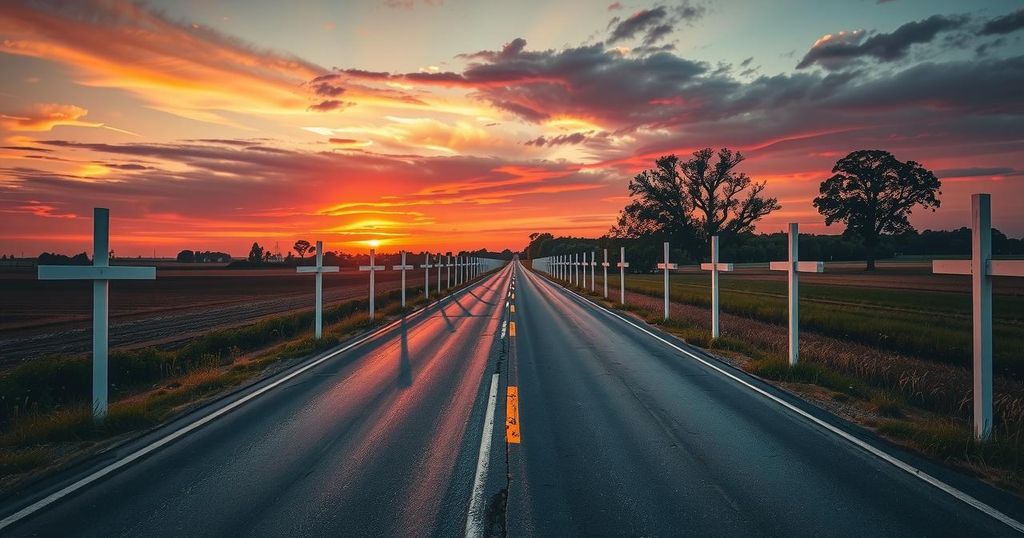South African Minister Slams Trump’s Claims of Genocide Against Farmers

South African Police Minister Senzo Mchunu criticized President Trump for misrepresenting a video about farm deaths. He emphasized that the crosses shown were memorials, not burial sites, and rejected the claim of genocide against white farmers as false. This incident highlights ongoing concerns regarding perceptions of violence in South Africa and its implications for U.S. relations.
In a recent statement, South Africa’s police minister Senzo Mchunu criticized U.S. President Donald Trump for what he described as “twisted” facts regarding the situation of white farmers in the country. Mchunu’s comments followed a meeting between Trump and South African President Cyril Ramaphosa, during which Trump showcased a video claiming it depicted burial sites for over 1,000 white farmers.
The video included an aerial view highlighting rows of white crosses along a rural road. Trump remarked, “These are burial sites, right here. Burial sites, over a thousand, of white farmers, and those cars are lined up to pay love on a Sunday morning.” Mchunu countered, clarifying that the crosses in the video were temporary memorials erected in 2020 to protest the killings of farmers throughout South Africa, not burial sites. Moreover, these were placed during a funeral procession for a white couple who were murdered during a robbery on their farm.
The minister emphasized the crosses were removed after the protest and do not signify graves. He further noted that although farm killings are a concern, they constitute a small fraction of the broader violent crime landscape in South Africa. “They are not graves. They don’t represent graves,” stated Mchunu, expressing disappointment over Trump’s characterization.
Mchunu highlighted that farm violence affects both white and Black farmers, reiterating the government’s condemnation of violence against all agricultural workers. “In principle, we do not categorize people by race,” he explained, but acknowledged a need for sensitivity regarding claims of genocide against white farmers. At the same time, he pointed out that, of the 5,700 homicides recorded in the country from January to March, only six occurred on farms, with just one white victim.
Lourens Bosman, a former parliament member, shared his experience during the procession related to the crosses seen in Trump’s video. He mentioned that these memorials were created to honor all farmers, irrespective of their race, who had fallen victim to violence over the past 26 years in South Africa. This reflects a broader misunderstanding of the situation, as Mchunu claimed Trump’s assertions stem from misinformation.
The South African government is firmly opposed to Trump’s allegations of a systematic campaign against white farmers, arguing that such narratives are unfounded. President Ramaphosa had previously sought a meeting with Trump to clarify these points and mend relations, given tensions arising from Trump’s executive order earlier this year.
This order, issued on February 7, terminated U.S. financial aid to South Africa, criticizing its government for not protecting its white Afrikaners and for their land appropriation policies. Additionally, the order condemned South Africa’s approach to international relations, particularly its stance towards Israel and Palestine, suggesting an anti-American bias.
Critics of Trump’s narrative maintain that attributing a genocide label to killings of white farmers oversimplifies a complex issue and misrepresents the realities faced by all farmers in the country.
In summary, South African leaders, particularly Police Minister Senzo Mchunu, have responded sternly to President Trump’s claims regarding white farmer violence in the country. They clarify that the video showcased by Trump did not represent burial sites but memorials, emphasizing the twisted narrative he presented. The South African government reinforces its condemnation of violence against all farmers, underscoring the complexity of crime within its borders rather than the simplistic version Trump suggests. This situation continues to strain U.S.-South Africa relations, especially following Trump’s executive order cutting assistance based on misinformation.
Original Source: apnews.com








